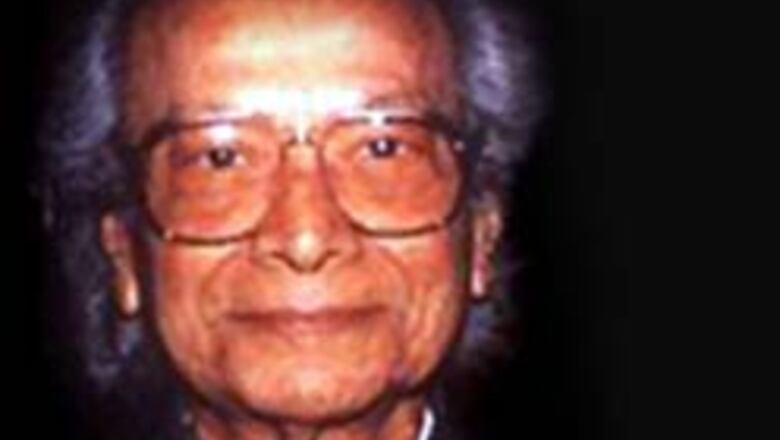
views
New Delhi: King of Bollywood's golden music era, Naushad Ali, who became a legend with his Hindustani classical-laced compositions for movies like Shah Jahan, Baiju Bawra and Mughal-e-Azam, died of a cardiac arrest on Friday.
He was 86, and is survived by six daughters and three sons. He had been admitted to the Nanavati hospital a few days ago following heart ailment. He breathed his last at the hospital at around 0930 hrs (IST) on Friday morning.
The veteran music composer will be creamated at the Juhu cemetry on Friday evening, family sources said.
Soon after his mortal remains were brought at his 'Ashiana' residence on Carter road in suburban Bandra, several film personalities including Dharmendra, music composer Uttam Singh and thespian Dilip Kumar came in to pay their last respects.
Naushad belonged to the golden era of music in Hindi cinema, which boasted of melody with a touch of class that was evident in his compositions like Mohe panghat pe nandlal ched gayo re (Mughal-e-Azam), Inhi logon ne (Pakeezah), Nain lad jayin hain (Ganga Jamuna) and Madhuban mein radhika nache re (Kohinoor).
Born on December 25, 1919 in Lucknow, he came to Mumbai in 1930s and became one of the most successful music directors of Hindi film industry.
His saga was literally a rags-to-riches story as he spent several days on the footpaths of Mumbai, before making it to the recording studios.
The octogenarian composer often recalled how he cried when his film Baiju Bawra was premiered in Mumbai.
When the producer, late Vijay Bhat, asked him why he was crying, Naushad replied that ''when he used to sleep on the footpath across the theatre, he had dreamt of seeing movies having his music compositions screened in it.''
''It took me 16 long years to cross the footpath,'' he had said with tearful eyes.
Hindustani classical music was the strong point of all of Naushad's compositions in movies.
Having learnt music from Ustad Ghurbat Ali, Ustad Yusuf Ali and Ustad Babban Saheb, Naushad developed interest in music while he repaired harmoniums and composed for amateur theatricals, under the banner - Windsor Music Entertainers in Lucknow before coming to Mumbai.
However, he ran away from home to Mumbai in pursuit of his dream, as his parents tried to pressurise him to stay away from music.
Naushad once said that music being a social taboo when he had started gaining recognition in Mumbai, his family in Lucknow fixed his marriage, but told the bride's family that the groom worked as a darzi (tailor).
''During the marriage, all my tunes were being played and my blissfully ignorant father-in-law wondered about the person whose music was driving people, both young and old, crazy.
Little did he know then that the person he was referring to was his own son-in-law,'' the veteran music composer had once recalled.
The Dadasaheb Phalke awardee was one of the last composers to have worked with K L Saigal for the famous number Jab dil he toot gaya in Shah Jahan.
He had impressed the legendary singer so much that Saigal reportedly wished that the soulful song be played along with Naushad's other compositions at his funeral.
The doyen composed immortal classics like Jab pyar kiya to darna kya in Mughal-e-Azam and the haunting Aayega aanewala in Mahal.
His tunes for the melodious music of Baiju Bawra and Mother India still hold listeners spellbound.


















Comments
0 comment